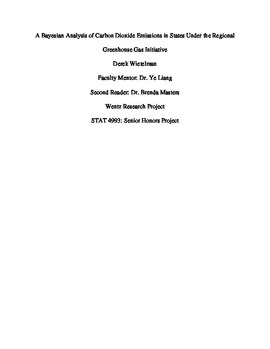| dc.contributor.author | Wietelman, Derek | |
| dc.date.accessioned | 2017-10-10T20:57:17Z | |
| dc.date.available | 2017-10-10T20:57:17Z | |
| dc.date.issued | 2015-04-28 | |
| dc.identifier | oksd_wietelman_HT_2015 | |
| dc.identifier.uri | https://hdl.handle.net/11244/52369 | |
| dc.description.abstract | In the field of environmental economics, cap and trade systems are an attempt at using a marketplace with as little government restriction as possible in order to reduce emissions of an undesirable pollutant. A hard cap on the amount of pollution allowed is set, and pollution permits allowing the holder to legally pollute are distributed in a variety of ways. Each year, the cap is lowered and fewer permits are allocated, forcing firms to streamline their processes to be more efficient so that they will need to purchase fewer permits each year. Several cap and trade programs like the EPA's Acid Rain Program and the European Union's Emissions Trading System have been implemented over the course of the last few decades. One such system that has been adopted in the Northeastern United States is the Regional Greenhouse Gas Initiative (RGGI), a group of nine U.S. states that have agreed to form a cap and trade program regulating carbon dioxide emissions from power plants. While cap and trade makes sense theoretically, experiments in public policy are carried out in the real world, not a controlled laboratory setting. This paper applies Bayesian modeling techniques using the statistical package R and its ability to interface with JAGS (Just Another Gibbs Sampler) to the yearly CO2 emissions data from power plants located in the RGGI member states to assess whether or not RGGI has been successful at reducing carbon emissions. JAGS software uses Markov Chain Monte Carlo algorithms, specifically Gibbs Sampling methods, to generate posterior distributions from the data given prior distributions. If it is ultimately determined that emissions have been falling under the RGGI, it may provide a template for other states and nations to design their own cap and trade programs. | |
| dc.format | application/pdf | |
| dc.language | en_US | |
| dc.rights | Copyright is held by the author who has granted the Oklahoma State University Library the non-exclusive right to share this material in its institutional repository. Contact Digital Library Services at lib-dls@okstate.edu or 405-744-9161 for the permission policy on the use, reproduction or distribution of this material. | |
| dc.title | Bayesian analysis of carbon dioxide emissions in states under the Regional Greenhouse Gas Initiative | |
| osu.filename | oksd_wietelman_HT_2015.pdf | |
| osu.accesstype | Open Access | |
| dc.type.genre | Honors Thesis | |
| dc.type.material | Text | |
| dc.contributor.director | Liang, Ye | |
| dc.contributor.facultyreader | Masters, Brenda | |
| thesis.degree.discipline | Statistics | |
| thesis.degree.grantor | Oklahoma State University | |
